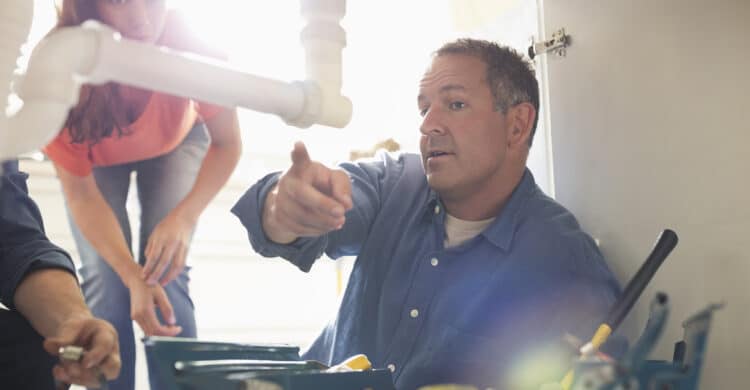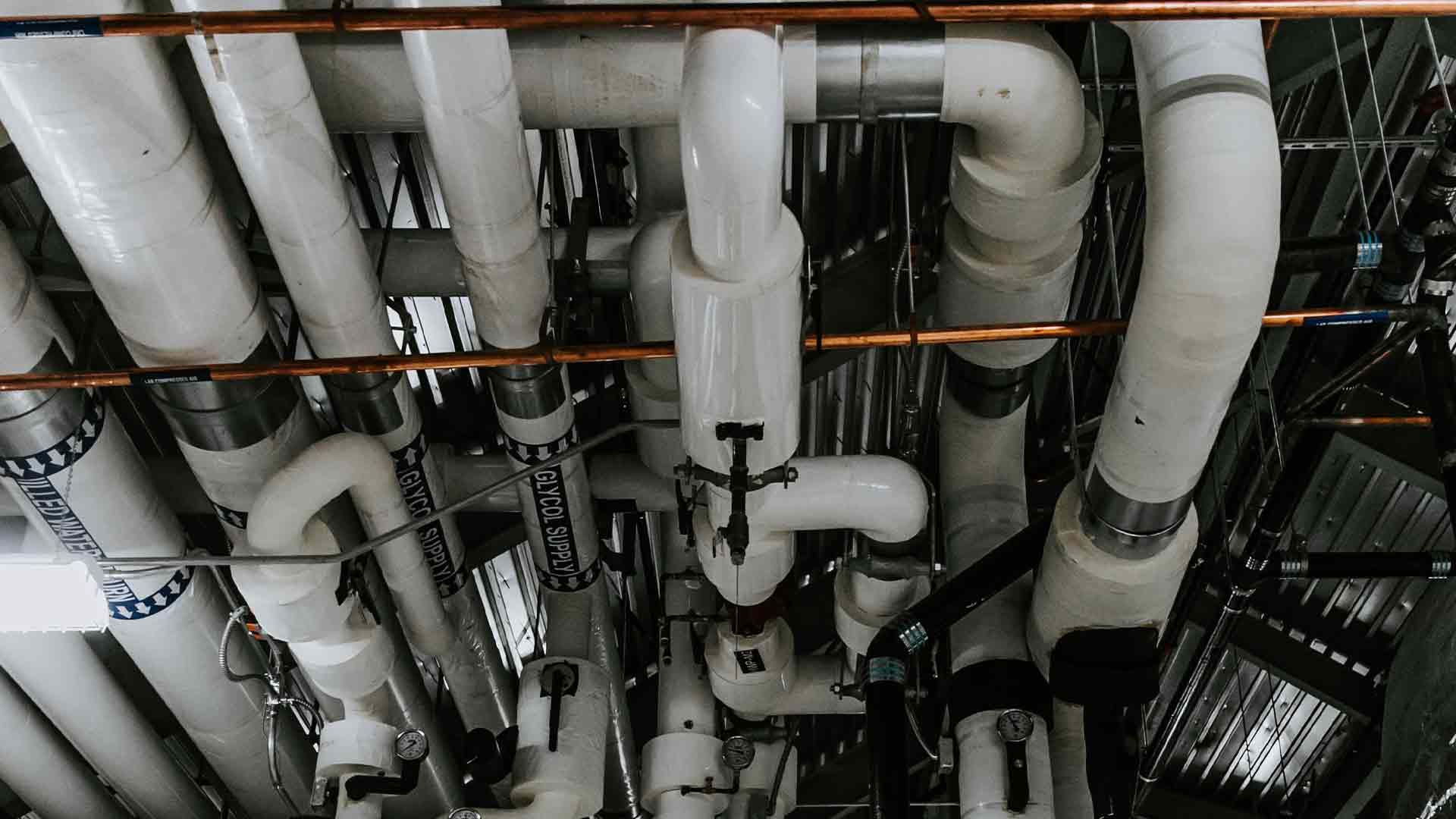
What are the Basics of Plumbing?
However, that does not necessarily make plumbing simple to address or work with, and there is a reason why plumbers require specialized training and experience. That said, understanding the basics of plumbing can also go a long way in helping you to make the right decisions if/when something does go wrong with your home’s water – determining whether something is an emergency or an annoyance.
With that in mind, let’s answer the question: What are the basics of plumbing?
Despite all the various moving parts in your faucets, water heater, and the pipes that run into, underneath, and throughout your home, plumbing generally comes down to four facets:
- Water supply
- Water distribution
- Water heating
- Drainage
Water Supply
This is the fresh water that comes into your home. It’s what keeps you clean and hydrated and is probably the aspect we take most for granted, as most of us have likely grown up with a consistently safe and reliable water supply here in this nation and certainly in north Georgia.
Speaking of north Georgia (and metro Atlanta), the water that comes into your home is likely from one of two sources: municipal supply or well.
Municipal supplies come in via the street in pipes – referred to as “mains” – that snake underground through your yard/property. All the water in those pipes passes through a water meter, which is a device that allows your municipality to note the amount of water your house is consuming. That meter can come in handy if you have a small, continuous leak, as it will note that more water is coming in than you think you are using. Unfortunately, that will lead to higher water bills. But it will also let you know that there is something going wrong that should be checked out by a professional. In these instances, plumbers can use small cameras to snake through your pipes and discover the source of the leak (which could happen in underground on your property due to a host of unseen circumstances, including root growth from trees). These types of failures are rarer than leaks and failures inside your home, but they can and do happen.
Also on your property, near your water meter will be a main shut off valve. You should locate where your shut off valve is so that, should you experience a sudden and catastrophic leak of any type, you can cut the water supply to your home and avert as much flooding and water damage as possible.
If you have a well, your setup will be much different, with no water meter. However, your well still has a shutoff valve should you need it. It will be located near the well itself – perhaps in a small utility box buried (but accessible) next to the well.
Also, your well will have a pump that controls water supply into your home. There are different types of well pumps, and some types require periodic, professional service. Submersible- and jet-style pumps should be serviced by a professional plumber. Submersible pumps should be checked (and possibly replaced) every 10 years and jet pumps every 3 years. Be sure to keep a track record of your well’s servicing handy. And if you are not unsure, contact a professional plumber to help determine if your pump needs servicing.
Water Distribution
Once inside your home, water is moved about and funneled to the places it is required by pipes, hoses, valves, and connections. These parts are often much smaller than the pipes leading to and from municipal water supplies and wells. Because of the constant changes in pressure and usages, they are also much more prone to breakdowns and leaks. That is why it is important that you get familiar with the piping inside your home – most specifically where the stop valves in your home are located. These valves will cut water supplies to various lengths of pipe and can be extraordinarily important should a section develop a clog or leak. That is because the stop valve allows you to isolate a malfunctioning section of plumbing without turning water off to your entire home.
Stop valves can look different depending on the size of the piping to which they are attached. But they will all have a handle or wheel of some sort that you can turn in order to shut down water flow. Knowing where these are located will allow you to turn a possible plumbing emergency into an annoyance and allow you to avoid calling a professional plumber should a leak occur outside of normal business hours (when charges might be higher).
Also, beware of any pipes that are exposed to outdoor temperatures in the winter. These pipes should be insulated or left dripping in order to prevent freezing and cracking.
Water Heating
This section of your plumbing is concerned only with your water heater, which is also an unsung hero in your home. That’s because you don’t think about how comfortable it makes your life – until it malfunctions. And all water heaters eventually break. The results can be quite messy, with flooded basements and possible water damage. That is why it is important you keep track of the age of water heater, and have it checked if it is nearing 8 years of use (if it’s electric) or 6 years (if it’s gas powered). To determine the age of your heater, located its manufacturer’s sticker. On it is a serial number that starts with a letter. That letter stands for the month of the year in which it was manufactured. The two numbers that follow the letter denote the year in which it was manufactured. For instance, the serial number A221069367 reveals that the water heater in question was produced in January 2022 (B is code for February, C for March, and so on). If your heater was manufactured 8-10 years ago or you have problems with it, please call us and let us inspect it ASAP.
Signs of a water heater nearing the end of its life include:
- Rust – This will develop on the tank itself or show up in the hot water coming out of your faucet.
- Noise – Failing heaters often make rumbling noises.
- Leaks – Any water on the floor around the tank is a sign of a small leak that could quickly turn bigger.
Also, be aware if you are suddenly struggling to achieve/maintain hot water. This does not necessarily mean you need to replace the heater but that it requires an adjustment. It could also mean that your hot water heater is too small for your household needs.
A failing water heater can be easily replaced by a professional plumber. But if you allow the water heater to break, it could end up leaking its contents all over your basement or crawlspace floor, making for a nasty surprise.
Drainage
These pipes remove dirty and used water and maintain the cleanliness of your home. These include the drains that lead from your sinks, showers/tubs, washing machine, and dishwasher – as well as your toilets. Each of these pipes have vents, traps, and (likely) cleanouts, in order to make them function properly and easier to repair/clean.
Depending on where you live, your sewage piping will also lead either to a municipal sewage system or to a septic tank (which must be emptied every so often).
Any of your drainage pipes can crack and fail but – by their nature – are much more susceptible to clogs. Small clogs can be simply dealt with by DIY methods, including chemicals and plumbing snakes. However, it is important to note how often clogs happen and to note that chemicals and snakes can also do much to damage pipes over time. So, do not consistently turn to these options to deal with backups and clogs, especially when it comes to sewage.
Any leaks that include sewage piping should be dealt with by a professional, as they can contaminate areas of your home and be dangerous to people and pets.
Your plumbing is a major part of your health and comfort, and that is why it is important to understand how it works, how to maintain it – and when you need help with a problem.
With all that in mind, know that Conditioned Air Systems is here to help with whatever your plumbing needs entail. Led by plumbing master John Payne – founder of Payne Plumbing – Conditioned Air is putting the same commitment and mastery it has in HVAC to the plumbing business. And, under Payne’s guidance, we now offer the same full range of expertise, customer service, and flexibility that you have come to expect from Conditioned Air’s HVAC services.
Payne, a north Georgia native, grew up in the plumbing industry and obtained his unrestricted master plumbing license over 25 years ago. He founded Payne Plumbing shortly thereafter. Thanks to John’s guidance, we will happily tackle any job, no matter the size or situation. And you can expect our plumbers to:
- Arrive on time
- Install it or repair it right, the first time
- Give you a fixed price with no hidden surprises
- Be friendly and professional
Just like our HVAC services, we offer 24/7 and emergency plumbing services to attend to your every need.
If you find yourself in a plumbing fix like any of the problems listed above or beyond, please contact us right away at 770-536-7509 and let us get your water running the right way again.
Meeting Your Plumbing Needs

